#expert evidence
Explore tagged Tumblr posts
Text
A Disjointed and Somewhat Incoherent Discrimination Case.
The discrimination law case of Giggle -v- Tickle For Girls (No 2) [2024] FCA 960 agitated some interesting issues.
Relevantly, the Court looked at Dr Helen Joyce and found: • She has a PhD in mathematics and is also a journalist and author • but does not have any formal education or qualifications even in biology, let alone in gender, sex or law, being the topics which her report purports to address. • She has no recognised expertise in any of the areas in which she purports to express an expert opinion. • What was proffered as an expert report, was received as nothing more than submissions [Paragraph 145]. • Her opinion was of no assistance to the case of the Respondents or to the Court [Paragraph 147].
The Court also found that case of the Respondents was run in a disjointed and somewhat incoherent way [Paragraph 215].
I find it extraordinary that a litigant (represented by experienced lawyers) seeking to be taken seriously, would endeavour to lead evidence from someone with no recognised expertise in any of the areas in which they purport to express an expert opinion.
Similarly, running your case in a disjointed and incoherent way is hardly a recipe for success and does little to enhance a reputation as capable and credible lawyers.
This critique informs the capacity of those litigants and lawyers to subsequently credibly comment upon the strengths and weaknesses of the case.
Credibility and coherence are crucial in legal proceedings. Sometimes, the passion to win can overshadow critical self-assessment, leading to disjointed arguments and reliance on unqualified witnesses who are proffered as experts.
Offering a non-expert as an expert and presenting a disjointed case can stem from a few key issues: • Overconfidence: The litigants or their lawyers might believe that the credibility of the individual or the strength of their arguments will prevail, regardless of expertise. • Desperation: Sometimes, a lack of strong, qualified experts can lead parties to lean on anyone with relevant-sounding credentials, even if they do not have recognised expertise. • Zealous Advocacy: A passionate belief in the righteousness of their cause can blind lawyers to the weaknesses in their approach. They become so focussed on winning, that they overlook the importance of coherence and credible evidence.
These missteps often result in weakened cases and can undermine the credibility of those involved. A successful strategy requires a clear, coherent presentation and expert testimony that stands up to scrutiny. Not always easy to acquire, but necessary.
It is quite telling when those who were ill-prepared lament their loss. Running a case in such a way and then decrying the outcome, shows a glaring lack of self-awareness and accountability. Preparing thoroughly and presenting a coherent, well-supported argument is foundational for credibility.
Presenting a non-expert as an expert is a sure-fire way to erode trust and credibility. It is astonishing that experienced lawyers would risk the attendant diminution of their reputation. This not only weakens their case, but also makes them look laughably under-prepared.
When you are too invested, sometimes your own biases and emotions cloud your judgment.
In the subject case the legislation was the problem and the judgment of the Court clearly stated that biology was not a relevant issue. Subsequently dealing with the problematic legislation has more utility than endlessly crying about biology.
If the legislation is flawed, that is the root issue to tackle. Getting bogged down in irrelevant debates only distracts from meaningful progress. Addressing the problematic legislation directly is the way forward, rather than fixating on ancillary issues.
1 note
·
View note
Text
Pre-Action Protocols, Expert Evidence, and Alternative Dispute Resolution: A Guide to Efficient Legal Dispute Management
Paragraph 6 of the Pre-action Conduct of all proceedings confirms that if a relevant pre-action protocol exists, parties are required to follow it before initiating legal action. This ensures that both sides take certain preliminary steps, such as sharing information and exploring potential settlements, to possibly resolve the dispute without court intervention. If no specific protocol applies,…

View On WordPress
#Arbitration#Mediation#ADR#alternative dispute resolution#claimant responsibilities#cost-sharing#court procedures#CPR 35.4(1)#defendant responsibilities#dispute resolution#efficient dispute resolution#expert evidence#joint expert instruction#key documents exchange#legal compliance#legal costs#legal dispute management#legal dispute preparation#legal guidelines#legal transparency#litigation#negotiation#pre-action protocols#settlement options
0 notes
Note
recently discovered some fascinating hobbies for a few of the older tv men ive been submitting for the vintage tv polls and that got me wondering what (if any) strange/niche/unique hobbies have you ever encountered among classic film actors?
I think my favorite is Danny Kaye, who was apparently the type of guy who would fall in love with something and fall hard—he wanted to learn how to fly a plane, so he did; he conducted orchestras with 0 ability to read sheet music; he became so riveted by the art of Asian cuisine he started studying under master chefs Johnny Kan and Cecilia Chiang in their San Francisco restaurants, eventually building a separate kitchen into his house to support his obsession, which lasted the rest of his life. I just think that's neat.
#asks#danny kaye#(also from what i've researched on it he did go the extra mile to learn chinese cooking respectfully + authentically.)#(i wouldn't bring this story up as fun if i could find evidence he did this in a weird orientialism or appropriation thing btw.#everything i could find indicates he fell in love with the authentic cooking process and went to the experts to learn.)#(as always can be corrected)
130 notes
·
View notes
Text
apologies for the random ass personal post but i graduated!!!!


having finished a degree feels incredibly fucking weird, but i now have a BSc. and the fact that i have a full scholarship for my research MSc in a couple of months is still insane to me. i’m also going to be working with the British Antarctic Survey which has always been a fucking dream for me.
anyway. successfully collected my first set of letters and i wanted to post something even though i’ll delete it.
this is a sappy ass post but i’m working class, disabled and first gen and so for me this is fucking huge.
anyway. i’m very proud of this :)
#oh also my dissertation was deemed ‘publishable’ by my department#still haven’t processed that#i am officially the world expert on this specific martian crater#i was looking at evidence for past glaciation there and possibility of life#anyway#im gonna stfu now#will delete this#i now have some time to breathe#and i have so much i want to write
59 notes
·
View notes
Text
an incomplete guide to UNIT Dating
I recently made and gave this presentation, so the information isn't entirely complete, but here. Basically I looked at every story the Brigadier appeared in and (with the help of this TARDIS wiki article) tried to put a date to all of them. some slides are missing to fit this into a single post, but not many and none essential
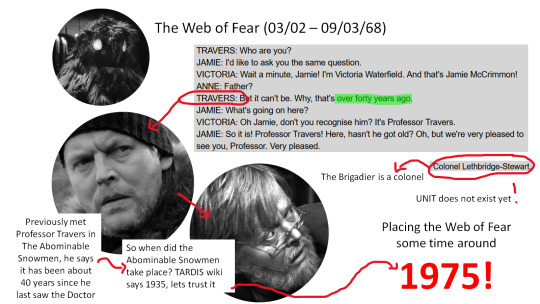
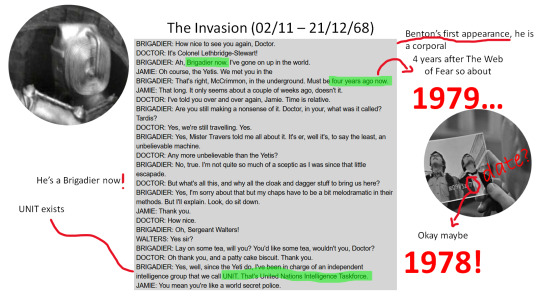
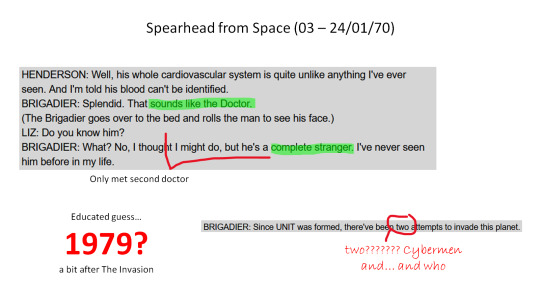

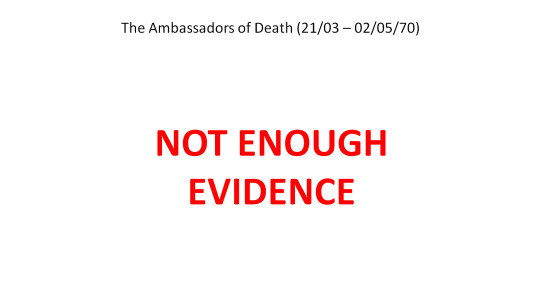


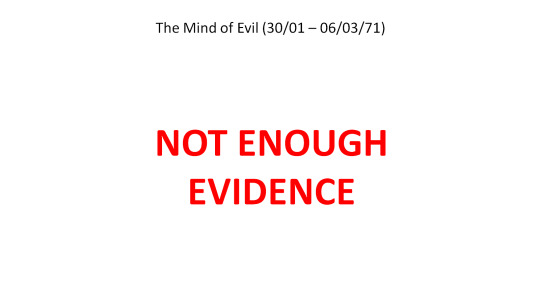
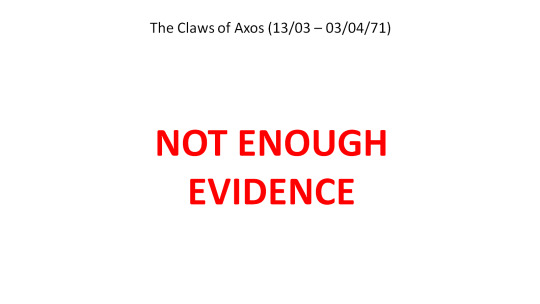
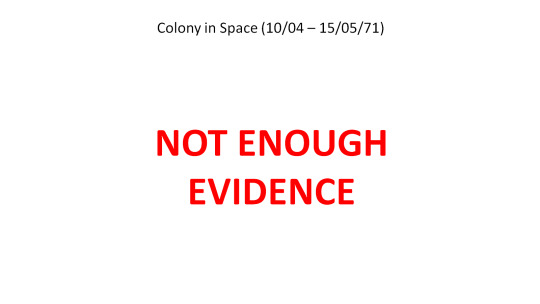
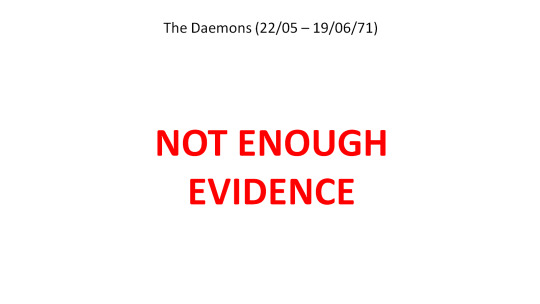

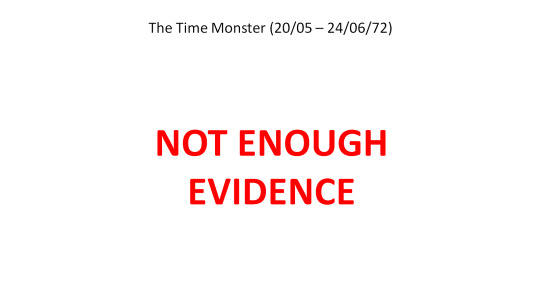
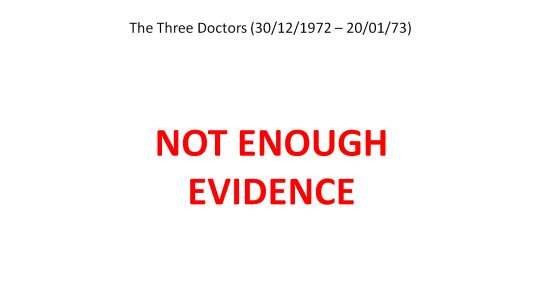
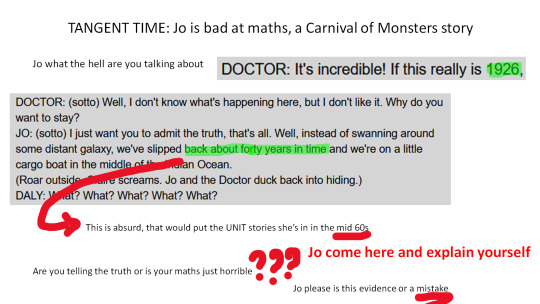


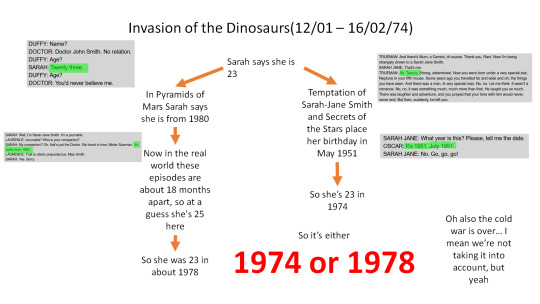
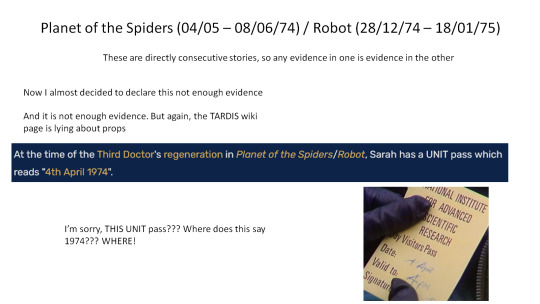


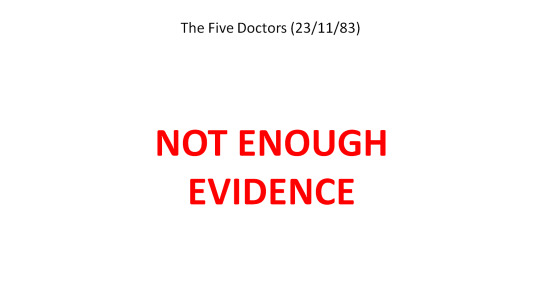




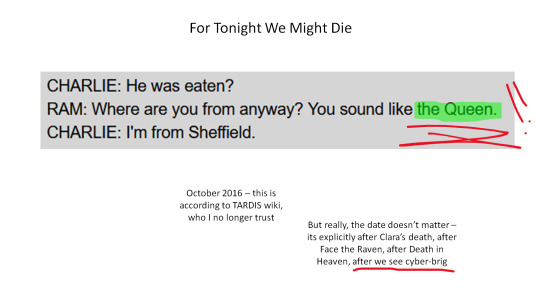

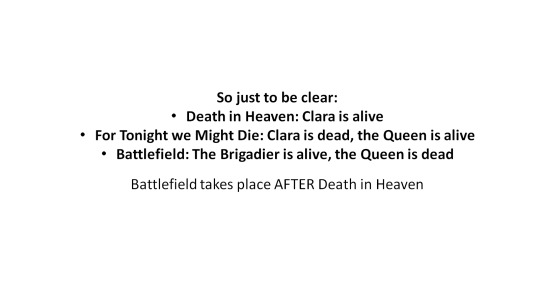
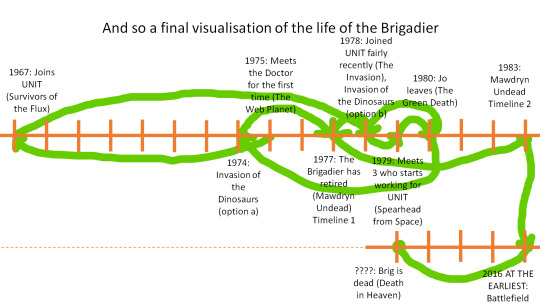
#doctor who#unit dating#i consider myself an expert on (TV) unit dating at this point#made a post like a year ago doing something similar#but i didn't verify anything which means it was wrong about green death and robot#and felt the need to set the record straight because its been doing the rounds lately for some unknown reason#although this technically covers less details because i didn't include stuff about like decimalisation of currency#as meaningful evidence this time#anyway whatever
60 notes
·
View notes
Text
god i miss when the internet wasn't garbage. you can't google anything these days without whatever answer you're looking for getting lost under a deluge of seo ai bullshit. cannot wait until the bubble pops and we might get useable search engines again.
#and yes. reddit is OFTEN a decent place to find those sorts of answers#but not always#like i just wanted to find out if theres any data on animals cracking their joints#and if not. why are humans so special in doing that?#i can get anecdotal evidence from reddit but nothing from actual experts#all the articles i got online were so obviously ai#they never named sources just 'a behavioral expert said this' and 'a vet said that'#which. if you wont even tell me those supposed experts' names i am SUSPICIOUS
21 notes
·
View notes
Text
"Among their complaints [in 1460, the Yorkists] specifically blamed the earls of Wiltshire and Shrewsbury and Viscount Beaumont for ‘stirring’ the king [Henry VI] to hold a parliament at Coventry that would attaint them and for keeping them from the king’s presence and likely mercy, asserting that this was done against [the king's] will. To this they added the charge that these evil counselors were also tyrannizing other true men* without the king’s knowledge. Such claims of malfeasance obliquely raised the question of Henry’s fitness as a king, for how could he be deemed competent if such things happened without his knowledge and against his wishes? They also tied in rumors circulating somewhat earlier in the southern counties and likely to have originated in Calais that Henry was really ‘good and gracious Lord to the [Yorkists] since, it was alleged, he had not known of or assented to their attainders. On 11 June the king was compelled to issue a proclamation stating that they were indeed traitors and that assertions to the contrary were to be ignored." - Helen Maurer, "Margaret of Anjou: "Queenship and Power in Late Medieval England"
Three things that we can surmise from this:
We know where the "Henry was an innocent helpless king being controlled and manipulated by his Evil™ advisors" rhetoric came from**.
The Yorkists were deliberately trying to downplay Henry VI's actual role and involvement in politics and the Wars of the Roses. They cast him as a "statue of a king", blamed all royal policies and decisions on others*** (claiming that Henry wasn't even aware of them), and framed themselves as righteous and misunderstood counselors who remained loyal to the crown. We should keep this in mind when we look at chronicles' comments of Henry's alleged passivity and the so-called "role reversal" between him and Margaret.
Henry VI's actual agency and involvement is nevertheless proven by his own actions. We know what he thought of the Yorkists, and we know he took the effort to publicly counter their claims through a proclamation of his own. That speaks louder than the politically motivated narrative of his enemies, don't you think?
*There was some truth to these criticisms. For example, Wiltshire (ie: one of the men named in the pamphlet) was reportedly involved in a horrible situation in June which included hangings and imprisonments for tax resistance in Newbury. The best propagandists always contain a degree of truth, etc. **I've seen some theories on why Margaret of Anjou wasn't mentioned in these pamphlets alongside the others even though she was clearly being vilified during that time as well, and honestly, I think those speculations are mostly unnecessary. Margaret was absent because it was regarded as very unseemly to target queens in such an officially public manner. We see a similar situation a decade later: Elizabeth Woodville was vilified and her whole family - popularly and administratively known as "the queen's kin" - was disparaged in Warwick and Clarence's pamphlets. This would have inevitably associated her with their official complaints far more than Margaret had been, but she was also not directly mentioned. It was simply not considered appropriate. ***This narrative was begun by the Duke of York & Warwick and was - demonstrably - already widespread by the end of 1460. When Edward IV came to power, there seems to have been a slight shift in how he spoke of Henry (he referred to Henry as their "great enemy and adversary"; his envoys were clearly willing to acknowledge Henry's role in Lancastrian resistance to Yorkist rule; etc), but he nevertheless continued the former narrative for the most part. I think this was because 1) it was already well-established and widespread by his father, and 2) downplaying Henry's authority would have served to emphasize Edward's own kingship, which was probably advantageous for a usurper whose deposed rival was still alive and out of reach. In some sense, the Lancastrians did the same thing with their own propaganda across the 1460s, which was clearly not as effective in terms of garnering support and is too long to get into right now, but was still very relevant when it came to emphasizing their own right to the throne while disparaging the Yorkists' claim.
#henry vi#my post#wars of the roses#margaret of anjou#Look I’m not trying to argue that Henry VI was secretly some kind of Perfect King™ whose only misfortune was to be targeted by the Yorkists#That is...obviously pushing it and obviously not true#Henry was very imperfect; he did make lots of errors and haphazard/unpopular decisions; and he did ultimately lose/concede defeat#in both the Hundred Years War and the subsequent Wars of the Roses.#He was also clearly less effective than his predecessor and successor (who unfortunately happened to be his father and usurper respectively#and that comparison will always affect our view of his kingship. It's inevitable and in some sense understandable.#But it's hardly fair to simply accept and parrot the Yorkist narrative of him being a “puppet of a king”.#Henry *did* have agency and he was demonstrably involved in the events around him#From sponsoring alchemists to issuing proclamations to participating in trials against the Yorkists (described in the 1459 attainder)#We also know that he was involved in administration though it seems as though he was being heavily advised/handheld by his councilors#That may be the grain of truth which the Yorkists' image of him was based on.#But regardless of Henry's aptitude he was clearly *involved* in ruling#Just like he was involved in plots against Yorkist rule in the early 1460s before he was captured.#And he did have some successes! For example in 1456 he travelled to Chester and seems to have been responsible#for reconciling Nicholas ap Gruffyd & his sons to the crown and granting them a general pardon.#Bizarrely Ralph Griffiths has credited Margaret for this even though there is literally no evidence that she was involved.#We don't even know if she travelled with Henry and the patent rolls offering the pardon never mention her.#Griffiths seems to have simply assumed that it was Margaret's doing because of 1) his own assumption that she was entirely in control#while Henry was entirely passive and 2) because it (temporarily) worked against Yorkist interests.#It's quite frustrating because this one of the most probable examples we have of Henry's own participation in ruling in the late 1450s#But as usual his involvement is ignored :/#Also all things considered:#The verdict on Henry's kingship may not have been so damning if his rule hadn't been opposed or if the Lancastrians had won the war?#Imo it's doubtful he would be remembered very well (his policies re the HYW and the economic problems of that time were hardly ideal)#but I think it's unlikely that he would have been remembered as a 'failed king' / antithesis of ideal kingship either#Does this make sense? (Henry VI experts please chime in because I am decidedly not one lol)
13 notes
·
View notes
Text
Mary Pope Osborn has redeemed herself with Dragon of the Red Dawn. Night of the Ninjas was such absolute crap - clearly she was still properly feeling her way into her whole “history lesson thinly disguised as adventure story” schtick, and in this second trip to Japan, we’re doing MUCH better. Very pleased that Teaschooler is learning about Bashō and historical firefighting methods. However, he was not pleased when I tried to read The Narrow Road to Oku to him.
#our never ending journey through the magic tree house#we HAVE listened to Dragon of the Red Dawn a lot#so I may stop having patience with it#but I’m enjoying the good research#UNLIKE LAST TIME#please note that I am not an expert by any means#one of my majors was Japanese and that comes with some historical familiarity#but obviously less than your average Japanese high school student#just enough to know when the periods I am more familiar with#are egregiously misrepresented#or the figures I am most familiar with#are reasonably well-represented as far as appropriate for elementary school fantasy books#we will try again with the narrow road to oku in oh eight or ten years#mostly I wanted him to know that these ARE real people in his books#who did real things#and we have physical evidence of that in our home
2 notes
·
View notes
Text
nothing worse than a YouTube video that's kind of wrong about a subject you know about
#mine.#it was about dropshipping crochet scams on tiktok#and like looking at the store front and then all of the identical items on temu. the dropshipping scam thing is a reasonable assumption#but the rest of the youtuber's evidence is so ???#“they have a bunch of different items in different styles” yeah theyre. a crochet business#and i genuinely dont know what the hell a “crochet style” is because most of the items were amigurumi and like. flowers#the steps to make a cutesy plush are the same as the ones to make a realistic plush. someone selling both isnt suspicious#“look at all these items! theres no way they could make all these that quickly!”#once again. they are a crochet business#someone making a bunch of stock and then filming their haul (? cant think of a better word) isnt suspicious#and most of it was like. pretty small stuff too#like not to sound mean but sometimes people are Better At A Craft than you#making a cherry keychain probably wouldnt even take me an hour and i dont claim to be an expert#im sorrrry to be a hater and the people doing this suck buuut#if you dont know much about crochet and dont run crochet booths or interact with crochet communities than maaaybe#you dont have enough knowledge to make a video about this
5 notes
·
View notes
Text
I think cybertron in the idw comics has some sort of feudalism type economy
#Now im not an expert in economics and while its easy to assume that idw1 cybertron was a capitalistic one i dont think thats quite true#For one everything is owned by the senators and theres no mention of private corporation as far as i can tell#Now id have to go reread the idw1 comics to gather more evidence and half of this is based off vibes but hey#Yapping
2 notes
·
View notes
Note
billie hasnt been tinkering with her face? if u see images of her from her teenager years she looks the same except ya know older cause shes 42 now
kindly disagree! as someone who has steadily watcher her career for years now, she's clearly had her share of Beauty Procedures, with the last two years in particular becoming Worrying to me
#i'm no expert so idk if it's just botox/fillers or sth else but it's Evident#youareworldsaway#a response
12 notes
·
View notes
Note
ugh ur recipe posts motivate me to feed myself better, i love seeing them whenever u post! how do you manage to like grocery shop and cook ur meals in a productive way? i find myself wanting to try recipes but end up getting the same few ingredients and making the same things 😭
i just answered a really similar ask you can refer to if this doesn't feel helpful, but the way i grocery shop and meal plan is hinged on the fact that i consume a wild amount of cooking content on the internet LOL . my process is basically that i'll pick 3-4 meals and a baked good/dessert to make throughout the week. i either come up with them myself or i'll choose a recipe to try from videos i've seen on instagram or posts from tumblr or youtube. i will try to coordinate these choices so they share some of the same ingredients to stretch my dollar and finish the things in my fridge for the week. idk if that is useful but that's the way i do it!! i also make lists of the meals i'm planning on so i don't forget and i try to plan which days i want to make them based on my work schedule and decide if/when i need to prep things ahead of time (dry brines, sauces, marinades etc) and i keep a little schedule in my notes app
#idk if any of this helpful lmk if i can answer anything else !#i'm no expert that is ... evident haha#but this is my process! i find it really fun and fulfilling most of the time!#asks
10 notes
·
View notes
Text
My favorite part about being still into Naruto is the way I'm into it means I frequently have to tell algorithms that I don't actually want to consume Naruto like they want me to. Don't give me bland voice over theories from people who need to be reminded of minor characters. I need my clinically not-normal girls, gays, and theys to talk with about the little side guys they have entire lives mapped out for, the interpretations that include their favorite filler episode because they like it and above all else people who don't shit on the women characters or only consider them, annoying and useless or waifu material.
#you ever stop interacting with the mainstream version of a fan of something#and forget how condescending and stupid they are#one time i was reading kakashi retsudan at an airport and someone asked me if i knew who the guy on the cover was#when i said yes he was like but really or just from that book#like dude none of thr short stories make sense if you haven't seen naruto shut upppppl#he tried to slamder sakura to me and i would not have it#i had to block this one channel that would act like an expert but still has not put together that naruto calling tsunade granny is not#evidence that his theory of tsunade being minatos mom is true#like thats just a cultural way of addressing a woman her age she explicitly states she had no kids#and it wouldn't even change his one idea of kage nepotism because shes still a senju granddaughter#like the fact she doesnt have kids is why there are no senjus around#and why the heck would Minato not take her last name if she was his mom#it is killing me so i needed to vent here#he just says it like its fact casually after he dropped his theory video too#not to stereotype but ohhhhbmy god cishet anime boys are a f#different breed (derogatory)
14 notes
·
View notes
Text
It dawns on me that the journey to the west took 5,040 days exactly, right, and while the book goes from tribulation to tribulation, there were still only 81 of those. And they were missing one when they got there. And some of the tribulations Tripitaka went through happened before the journey even started.
So, even being generous and saying that most of the tribulations that occurred during the actual journey could be said to have taken a few days to handle each, that's still only about 10% of the journey. A tribulation was anything that happened that put Tripitaka in danger or presented any sort of obstacle to him. Anything even remotely exciting would have fallen into that ~10%, and nothing else could have happened, because otherwise they wouldn't have gotten west one moderate inconvenience and/or major trauma short of the prize. (I mean, unless the thing that happened managed to not involve Tripitaka at all in any way, but that's very hard to do when you are all attached at the hip.)
Holy cow they really were just walking. ALL THAT TIME. No wonder Zhu Bajie was stirring the pot at any given opportunity. It was literally the only thing to do.
#jttw personal#how did they not kill each other#I was thinking about this while still picking at chapter 27#tripitaka was super gullible in that chapter in a sort of inexcusable way but also#it sooooort of makes sense when you think like#statistically#across the whole journey they could have gone moooonths between demons#years even#and suddenly sun wukong's claiming to have killed 3 (they didn't know it was the same demon) in a row in one morning?#even if tripitaka HAD believed him (or just harbored doubts) after the first one how likely was it the second was the case? or the THIRD?#obviously the evidence was in his face but couple the idea that their encounters with demons were actually SUPER rare#with the fact that tripitaka still had major trust issues with sun wukong from the fact he HAD trusted sun wukong previously#only to have that trust pretty solidly broken#and tripitaka's probably operating on a level of 'fool me once' hyper-vigilance against him that actually makes zhu bajie seem reasonable#I mean who are you going to trust? you and your own shitty judgement when you've already been wrong about the guy once before?#or the DEMON who probably knows more about DEMON MAGIC than you?#tripitaka's got TWO expert consults telling him two wildly opposing things but only ONE of them's seriously burned him in the past#(while the third expert consult and tie-breaker is notably abstaining. gdit sha wujing.)#anyway the characterization here is actually really good#tripitaka doesn't know the story framing - WE know something's up because otherwise we wouldn't have a story about it -#but tripitaka doesn't realize he's in a book#and I'm just saying tripitaka is being less foolish than the meta knowledge of being The Reader makes him seem#still a total brat though#he's definitely letting his own pride and hurt (and like...trauma) bias him against sun wukong unfairly#which is something he needs to work on and IS something that he pays for#(even with the bandits: expecting sun wukong to behave to tripitaka's standards of morality prior to TEACHING him those standards)#(wasn't fair. but also when he *tried* to address it sun wukong got angry and took off. and then tried to kill him. so.)#it's just interesting and whoever told this story originally was clearly putting a lot of thought into what it would be like#to actually be in these guys' shoes. Like ugh. HOW is this book so good?
11 notes
·
View notes
Text
mental health experts are not a thing
#i don’t think anyone should claim to be one#as someone who has been through many many mental health trainings and has various certificates and volunteered for a suicide helpline#and whose job is v closely to do with mental health#no one really knows what they’re doing#we’re all just winging it#yes there’s some evidence for cbt helping some people but it’s not going to help with v deep seated issues#also i know my own personal experience is not everyone’s but it has not been good#i remember going to talking therapy for the first time and saying idk what I’m doing#and they said you need to remember WE know what WE’RE doing#i used the service twice & they did not#i’m sure they were kind#well meaning compassionate people and i admire them for that#but it’s frustrating being encouraged to trust people bc they’re ‘professionals’#and then seeing they have no idea how to help#a psychiatrist told me he could make my bdd go away#he just kept asking me if I thought he was delusional bc he thought I looked okay#no but that doesn’t make me delusional either#we just have different standards and values#one bdd ‘expert’ literally said nothing about BDD the entire time#he was nice though & we talked about his pets p much the entire time#had one meeting with a counsellor who gave me factually incorrect information then told me i was wrong even though i could easily prove it#one bdd ‘expert’ at least was honest with me that she couldn’t help#bc ‘you can only get better if you’re doing it for you not your parents’#another lady thought that if she could get me to retrain my attention that would solve everything#basically ‘just think about other things’#a lady at the counselling place at uni told me to read a book on social anxiety#one psychiatrist asked me what celebrity I’d like to look like#said oh I see it you look like her#I do not#then a bit later said I think you look way better than her
2 notes
·
View notes
Text
in honour of grammys weekend being here, these are what I'm rooting for:
rolling up the welcome mat for best country album. probably a total long shot but I would literally sacrifice all my other hopes for this one to win
anti hero for song of the year (+ record of the year would be nice, but I'm mostly hoping for soty)
I think I'd like guts for album of the year, although obviously would be happy for it to go to midnights
noah kahan for best new artist
as usual, jack antonoff for producer of the year
ballad of a homeschooled girl for best rock song (I know nothing about rock I just think it would be fun for a song about being an awkward teenage girl to win this category)
in your love by tyler childers for best music video (also country song or country solo)
#this is evidently not an expert these should win selection#they're just the ones that make me go 'yes :) that one please :)'#there are other categories i have preferences for but these are the ones i'll be checking first#especially for kelsea. she's been so snubbed for rutwm so far :(#talking
9 notes
·
View notes